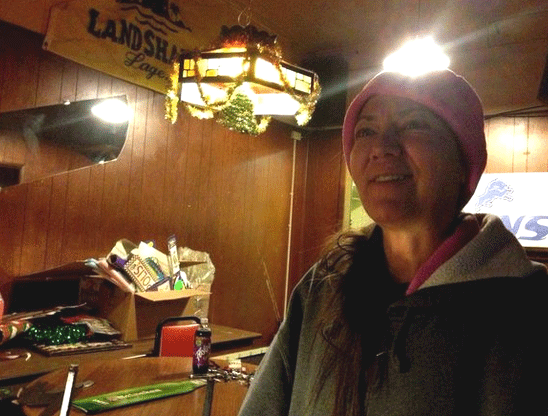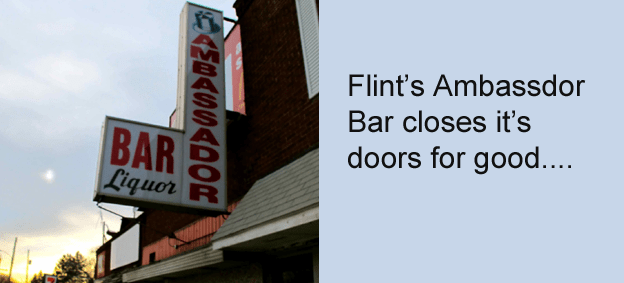
FLINT, MI — On Jan. 13, Karen Hubbard sat on her fiance’s lap on a piano bench at the back of the Ambassador Bar, and leaned her head against his.
There was a time when even at 7 a.m. you couldn’t find a seat in the place, she said, when the final whistle had sounded for the third shift General Motors workers and they would fill the place with laughter and jokes.
When they weren’t there, it was the police, who would hold birthday or retirement parties, as would the people in the neighborhood who, before the health department put a stop to it, would bring dishes to pass and hold potlucks.
But those days are over. The bar was empty, already cleared of much of its possessions, many of them — mugs, pictures from the wall, pool balls — given away as tokens on the Thursday before, keepsakes for customers and a way to have less things to move out the next after they closed the doors to customers for the last time.
“We’re sad,” Hubbard said, as she sat with John Trimble, who took over the bar — the first in Flint to receive a liquor license following the end of prohibition — in 1980.
In a way, that’s all there was to say — but at the same time neither could say enough.
There was the time that Hubbard had duct-taped a regular’s mouth shut when he got too mouthy, but left him a hole for a straw. There were the customers who’d they’d visit in hospitals long after they were too old to visit the Ambassador anymore, taking them their favorite food (and one time, sneaking a beer) before they died.
In fact, the history of the Ambassador, and its legacy, Trimble says, is the customers.
“It wasn’t about me,” Trimble said, speaking in his unhurried, throaty voice. “It was the customers who kept me alive.”
“But you kept them alive, too, John,” Hubbard said. “If one of our regulars got laid off, they got a job here. … If they needed a hug, they got it. If they needed a ride from the big boy (that’s Hubbard), if he was home in bed, he’d get up and do it.”
Hubbard didn’t want to close, but said the bar was no longer keeping up with the bills — hadn’t been for a while — and he just couldn’t keep it open any longer.
It was a decision made that much harder by the fact Trimble essentially grew up there. The bar at 1107 North Chevrolet Avenue, just north of Flushing Road, was something of a second home. When he was 10, his father died and his aunt and uncle, who owned the bar “sort of adopted me,” he said. He would go there after school and play pinball, and remembers it as the kind of place people came for a beer and for laughs, where they’d get run out by his uncle if they didn’t watch their language.
When his aunt was too old to run it anymore, he took it over.
“I promised her on her deathbed I would keep it going as long as I could. But it’s gotten to the point where I couldn’t keep up with the bills. … I hate to do it,” he said. “I feel like I let her down. I feel like I let everybody down. But I did the best I could.”
He took it over from family, but he and Hubbard both say the bar — the employees and their customers, were as close to them as any blood relative.
“Everybody came here for their birthdays, for their retirement parties. It was home,” Hubbard said.
And they treated it like home. Hubbard would spend 45 hours decorating for every holiday. She kept a box of toys behind the bar — among them flying stuffed monkeys — that she would pull out as jokes, or sometimes to cheer people up who walked in looking down.
“If you walked in sad or lonely, you got a smile before you walked out the door,” she said. “I knew what everyone drinks. Still do. It’s weird.”
Both said they saw the end coming, and it started in 2010, when the state passed a law banning smoking in bars.
“My customers would look at me and say, ‘Karen, I love you, but I can go home and smoke outside, and the beer is cheaper,'” Hubbard said.
The popularity of Keno in bars also didn’t help sales. Bar owners, Trimble said, only keep 1 percent of the sales and 6 percent of the winnings from Keno — which doesn’t add up to much he said, especially when, as one person put it to him: “You know I’m going to spend half as much on beer now, right,” he recalled.
Things got tougher even sooner as one of their biggest clienteles, shop workers, were no longer in the area as GM closed down plants. Then more people moved out of the area, Trimble said, and as those people sold or rented out their homes, the feeling of community in the neighborhood declined.
There were still the cops who would come in, “The cheapest beer drinkers,” Trimble said, laughing, and nearby Kettering brought in a new crop of young people. Hubbard, who never sat down during a shift in 26 years of bartending, started working about 62 hours a week toward the end, not taking pay for all her hours in order to cut down on payroll costs. But it just wasn’t enough.
Both Trimble and Hubbard see it as a sign of the times, when keeping a locally owned neighborhood bar going is just too tough. They had planned on selling the bar one day and retiring.
“When we get emptied out of here, I’m going to have a big, fat cry,” Hubbard said, adding that she hopes in the future to hold “a big, old barbecue” every year so the family can all get together again.
[nggallery id=2]
A great friend of mine from The Ambassador

THORNTON, Carl Leonard 65 of Oakwood, OH., passed away Mon., Nov. 7, 2005. Carl retired as a Tenured Professor of Organizational Behavior from Kettering University (formerly GMI), Flint, MI., in 2000, having served there since 1986. From 1978-1986 Carl was with the NCR Corp., Dayton, OH, last serving as Director of Training/Development, Engineering & Manufacturing Group, and was functionally responsible for the educational programs at 16 US manufacturing and 8 international locations of NCR. From 1976-1978 he served as the Executive Director of Personnel Affairs, University of Miami, FL. From 1973-1976, he served as an Assistant Professor, GMI and consulted full time with General Motors, Corporate, Detroit, MI in developing performance appraisal systems implemented in all 32 divisions of GM. Additionally from 1970-1976 he served as a Consultant of Psychological Assessments and Test Administration for the Bureau of Vocational Rehabilitation (BVR), primarily in Columbus, OH and Flint, MI. From 1963-1973, he worked at the Goodyear Corp. in Akron, OH. Carl received a MA and PHD in Psychology from the University of Akron, OH., and authored or co-authored 25 professional journal published submissions. Carl graduated from Tallmadge HS, outside of Akron, OH in 1958. He was preceded in death by his parents, Leonard E. and Mary Virginia (Teel) Thornton of Akron, OH. Carl is survived by his wife of 42 years, Janice Elaine (Mattingly/Baranchik) Thornton; 3 children, Matthew C., Miriam (Mimi) C., and Maria E., all of the Dayton, OH area; 4 grandchildren, Maiya, Connor, Kataryn, and Jerico; and a sister Judy and husband Michael Frahlich of Simpsonville, SC. His final resting place will be at the Woodland Cemetery Mausoleum, Dayton, OH. There will be a private family memorial at a later date. Memorial contributions may be made in Carl’s memory to the charity of the donor’s choice.
FROM: http://www.jehovahs-witness.net/jw/friends/101791/1/Larcs-Family-Placed-Obituary#.UtdagNJDuSp


